# 01 Feb 2019, 05:18PM: Prior Art:
On Friday, May 3rd, in Cleveland, Ohio, USA, as part of PyCon North America, I'm leading an arts festival called "The Art of Python". The call for proposals is open now, deadline 28 February. And I'd love your help not just proposing work, and helping publicize this, but helping me understand what's new and not new about this.
"The Art of Python" will focus on narrative, performance, and visual art. We intend to encourage and showcase novel art that helps us share our emotionally charged experiences of programming, particularly but not necessarily in Python. We hope that, by attending, our audience will discover new aspects of empathy and rapport, and find a different kind of delight and perspective than might otherwise be expected at a large conference. We are interested in how fictional narrative, visual and performance art, and different presentation formats can make different kinds of teaching and representation possible.
There's more about this at my co-organizer Erty Seidohl's blog post, including an invitation to also propose your "not-talks" to !!Con starting in a few days. "The Art of Python" is seeking your proposals now and the deadline for submissions is 28 February. And if you've never written a play and want guidance so you can write your first, we have a guide and sample scripts!
So why did I call this entry "Prior Art"? Because I'd like to know more about past artworks about the experience of making technology at technology conferences that have resonated with you, especially fictional narratives and live performances.*
A few of our inspirations are recent works of mine, like "Pipeline", my critique video about the tech industry, and the plays I made with Jason Owen ("Python Grab Bag: A Set of Short Plays" and "Code Review, Forwards and Back").
I must be following in footsteps I don't know. So: Who else did full-on plays at tech conferences? I wouldn't be surprised if someone did it a decade before me and I never knew. Go ahead and comment on this GitLab issue to share your comments.
Thanks to Erty and to Brendan Adkins for co-organizing "The Art of Python" with me! Thanks to PyCon's Hatchery program for new PyCon events, which makes this festival possible! Thanks to Jackie Kazil for the festival name! (My codename was "Spectacle!" which is probably misleading and less accessible.)
* A footnote here about music and webcomics and Halt and Catch Fire and whatnot grew enough that it'll be its own entry.
# 06 Feb 2019, 12:06PM: A Few NYC Winter Hikes:
I'm better when I hike more often. It nourishes me to clamber around rough trails and navigate and be among trees.
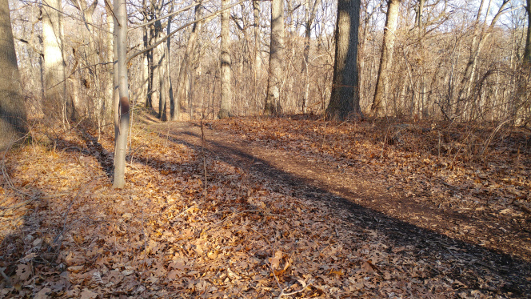 You actually can use city transit to get to parks within NYC for a short or daylong hike.
You actually can use city transit to get to parks within NYC for a short or daylong hike.
The other day, as it warmed up in the afternoon, I took the subway to Woodhaven, then a bus to Forest Park, yes, that is its actual name. Trail guide, map. The orange-blazed route took me about an hour and a half, including a little bit of getting lost and backtracking. There are substantial chunks where I couldn't hear or see cars/streets nearby. I needed that.
Another reasonable winter hike is the Greenbelt Yellow Trail (I did it from the northeast trailhead), which:
Traverses the entire Greenbelt from its Northeast corner in the community of Todt Hill to its Southwest corner in New Springville; access Moses' Mountain at Rockland Avenue and Manor Road behind bus stop....
This moderate-to-difficult 8-mile long trail brings hikers through Reeds Basket Willow Swamp. It ascends Todt Hill, then parallels the Blue Trail. Moses’ Mountain is located off the Yellow Trail off Rockland Avenue near High Rock Park.
Depending on where you're starting in NYC, you can take a combination of subway, bus, and ferry to get to the northeast trailhead. For me it was a full day's hike. At the other end I stopped in a strip mall restaurant for dinner before taking another combination of transit home.
The NYC Parks site lets you search the parks and filter for the ones that have hiking trails. That's how I found Forest Park.
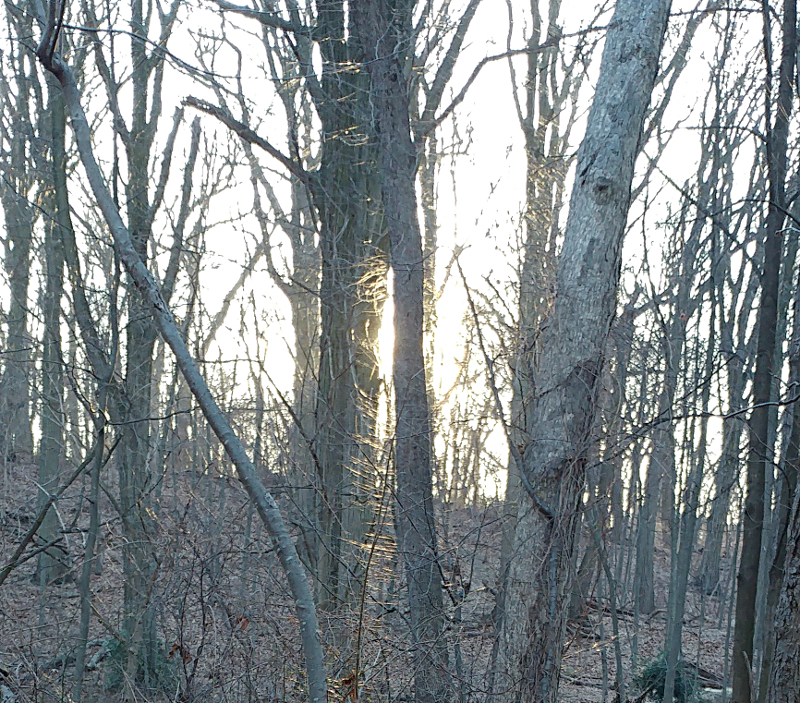
# 07 Feb 2019, 05:49AM: My Recent-ish Government Transparency Efforts:
I've put together a page of my past few years of Freedom of Information Law requests and the responses they've garnered. In particular, folks might be interested in the NYC Department of Health and Mental Hygiene's followup reports to 2005's Local Law 20, regarding the quantities and locations of automated external defibrillators at certain public places -- they wrote these reports and submitted them to the City Council, but I couldn't find them anywhere online till I asked DOHMH for them.
Now I have a Muckrock account, which I used to successfully get the list of ~600 DMV-licensed driving schools in New York State. Funniest names: "Accurate Drving School", the coexistence of "Evolution" and "Revolution" driving schools, "Good Luck Driving School", the coexistence of "Mistah Driver Auto School" and "Mister Driver Driving School", "Super Mario's Driving Connection", and "Totally Cool Driving".
# 07 Feb 2019, 09:17AM: Socratic Questioning, Devil's Advocacy, and Conversational Power Tools:
"Devil's advocate" was a job. In order for someone to perform the role of Devil's advocate, someone else had to appoint them to that position. And the Devil's advocate performed a bounded task within an established relationship with his debate opponent, towards the shared goal of a particular decision (whether to canonize someone).
Socratic questioning is a technique that a teacher uses with a student when both of them have agreed to that relationship. It includes a commitment by the teacher to the student's intellectual growth, and a variety of techniques in reflective listening.
I hang out in a lot of communities and with a lot of friends who care a lot about seeking truth and avoiding delusion. That's an admirable thing to want.
But in acting out these values, sometimes we misuse cool-looking tools, like Socratic questioning or the Devil's advocate position, by using them when we don't yet have a trusting relationship or (in particular with the "Devil's advocate" approach) a defined question and decision framework. For instance, if you consistently say things you don't mean in arguments, the people you are arguing with will come to trust you less. My friendships, work relationships, and hobby communities usually sit in the "caring" or "collaborative" part of the caring-to-combative spectrum;* if someone starts a competitive or even combative conversational game without first taking care to establish a magic circle, that breaks trust.
In conversation, when I find that I don't agree with someone else, I assume that our shared goal is to reach a mutual understanding. Perhaps one of us will persuade the other, or maybe we'll just understand why we disagree. But I'm open to revising that assumption in response to certain signals. When the person I'm talking with starts demanding that I stop to create and defend formal definitions for any word or phrase that I use, distributing the work of creating a shared understanding unequally, or cross-examining me without putting up their own point of view for examination, there's a level of disingenuousness there that I object to (the flip side of which a 2017 XKCD illustrates):
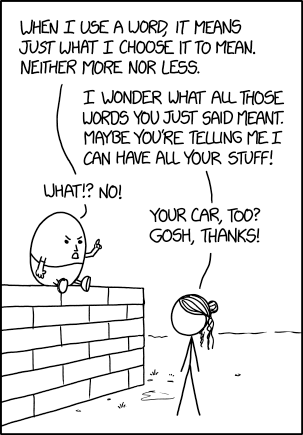
[comic transcript]
And the phrase "I'm just playing devil's advocate" in an online discussion, when the poster has not already asked others whether that's desired, is one of a suite of linguistic markers that make seasoned readers shake their heads. Because, as Alexandra Erin points out, "The phrase has basically morphed into Internet Argument Guy for 'I can argue with you but you can't argue with me.'"
If you want to "play devil's advocate" with me, or Socratically question something I've said, ask first, and mean it. And, as you reflect on whether you actually want to do that, consider the many other conversational approaches you might use instead.
* In retrospect I wish I'd considered this spectrum when discussing the liberty-to-hospitality spectrum.
# 11 Feb 2019, 03:04PM: Some Movies Are For Not-Me:
I haven't really been keeping up with reviewing movies here. Some recent joys: I loved Spider-Man: Into the Spider-Verse, which was astounding in its artistry and the marriage of story and virtuosic presentation. The Muppet Christmas Carol, which I'd never seen before I think, made me cry buckets and is an excellent adaptation of the Dickens! Won't You Be My Neighbor?, The Peacemaker, and Infinite Football are a sort of only-in-my-mind trilogy of documentaries about men's quests to improve some corner of our world.
But also: I've seen a few films recently for which I am perhaps not the target audience! Examples follow. Most of these were with Leonard so his film reviews are longer and more interesting.
- The Jim Carrey film Man in the Moon about Andy Kaufman. Some quick impressions:
- The treatment of women in this movie, or in Kaufman's actual career, does not age well.
- Kaufman says he's not a comedian, but the ground he explored fed into areas people who comfortably call themselves comedians explore today, so I'm fine with including him under the comedian umbrella. Relatedly: I am currently impatient with people who "don't like labels" regarding the super-well-trodden work they do. You may be super uncomfortable with the fact that you are a comedian, an engineering manager, what have you. Deal with that discomfort instead of fleeing the truth.
- The fact that Kaufman meditated a lot is a hint that meditation, on its own and ripped out of any ethical framework, does not actually make someone a better or more loving person. If you use meditation as a technology to better separate yourself from illusions, you may just use it to be a better trickster.
- I also have, within me, the self-indulgent urge to mess with the audience, to confuse them and cause stirrings of unease. But, as Harry Josephine Giles points out, "Learning how to care for your audience is actually far more aesthetically interesting and politically disruptive than working out how to shock them."
- Lilo & Stitch. This movie has multiple jerks in it, as protagonists, and does not sufficiently provide onscreen proof for assumptions that it assumes you'll go along with (e.g., the best way to make sure the orphaned child gets sufficient care).
- Attack the Block. I think I saw this at the wrong time -- it was fresher when it came out, and I'd already seen films it influenced before I saw Block itself -- and it means more if you're steeped in the urban British context.
- A Serious Man. A well-made depiction of certain kinds of agony.
- Victoria & Abdul and Manikarnika: The Queen of Jhansi, both of which seem to think the problem with the British oppression of India is that local subjects were deprived of a wholesome, classy, righteous queen (rather than, say, that Indians were deprived of representative democracy).
- Beauty and the Beast, yes, the 1990s Disney animated blockbuster - I'd never seen it before. Wow, there are no men in this movie whom I would trust to buy 3 apples for me at the market.
There's more, I'm sure, but I don't want to go into a depressingly long list. I am not that much of a fiction author, and when I see people acting irresponsibly in fiction, I nearly physically want to reach into the screen and get them, like, therapy and a nap -- I want things that would make their lives better even if it would make the story worse.
# 14 Feb 2019, 08:58AM: Puns About Domain Names Are Kinda Par For The Course Around Here:
I blearily woke this morning - Leonard was already up. I wished him a happy Valentine's Day.
"I think we really match. And in some sense, because we met online,* we met in e-harmony. And when I think of you, I say: OK, cupid."
He was definitely laughing by this point.
"But even though there are plenty of fish in the sea, I'm glad that we're consumating, that we ... something, something, spark, tinder ..... OK, I can't figure out how to work in JDate."
"Isn't that where Ashley Madison works?"
"Oh, that's good... wait! No! Not that one!"
He also offered to get me a "coffee and bagel" which reminded us of someone I met who showed me how the Coffee Meets Bagel app works. I had mentioned that I'd heard of the "bagel of the day" mechanic from the New York Times "Vows" section, and she'd replied, somewhat resentfully, that "Vows" is filled with people marrying their "bagel of the day". "Oh, it's The Ladders of dating apps," Leonard compared. (I'd also asked her: ok, if you have a "bagel of the day", and they have you as a "bagel of the day", then who's the coffee??!! She and I settled on the unsatisfying conclusion, "everyone is their own coffee".) We talked about how the "bagel of the day" seems to create temporal scarcity, to push the user to be more impulsive and go ahead and say yes.
"No, you have 24 hours to make a date, not to meet them -- how would that work? Like, you use NFC or Bluetooth and tap your phone to theirs? It's a dating app, not a scavenger hunt....I'm glad we're together, that we don't have to do the dating world, go through that grinder .... Grindr's actually even less appropriate to us than Ashley Madison."
Anyhow! My sympathies and best wishes to everyone today. I literally loathed Valentine's Day so much, as a teen, that I wrote an anti-Valentine's Day editorial every year, for all four years of high school, in my school paper, including one science fiction story where future kids marvel that back in the 20th century people had this awful destructive ritual. Now I have an old, familiar "grah" about it, plus a friend who works at a greeting card company and has to attend to battle stations all day.
So, whoever you are, I hope you get some laughs today and some unexpected delight, and, if you like puns, puns. More than the ones above, I mean.
* I met my partner online the old-fashioned way, by reading his blog.
# 17 Feb 2019, 11:53AM: My Open Data Quest, Part ... 11?:
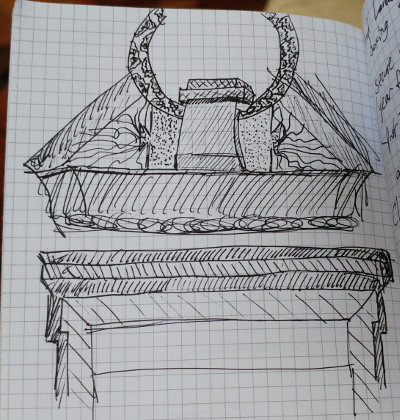 On Tuesday night, I attended a committee meeting of the NYC council's Committee on Technology at City Hall (another view) and gave a bit of public comment (video -- my testimony is 02:05:03 till 2:09:11, then there's some back and forth between me & other folks 2:14:22-2:17:12).
On Tuesday night, I attended a committee meeting of the NYC council's Committee on Technology at City Hall (another view) and gave a bit of public comment (video -- my testimony is 02:05:03 till 2:09:11, then there's some back and forth between me & other folks 2:14:22-2:17:12).
Background:
Back in 2017 I was following the "algorithmic transparency" conversation in NYC and even ended up speaking before this same committee.
A friend and I thought that Tuesday's meeting would be about the Automated Decisionmaking Systems Task Force that resulted from those 2017 discussions, but turned out to be less about that and more about the Commission on Public Information and Communication and oversight of open data-y things in general.
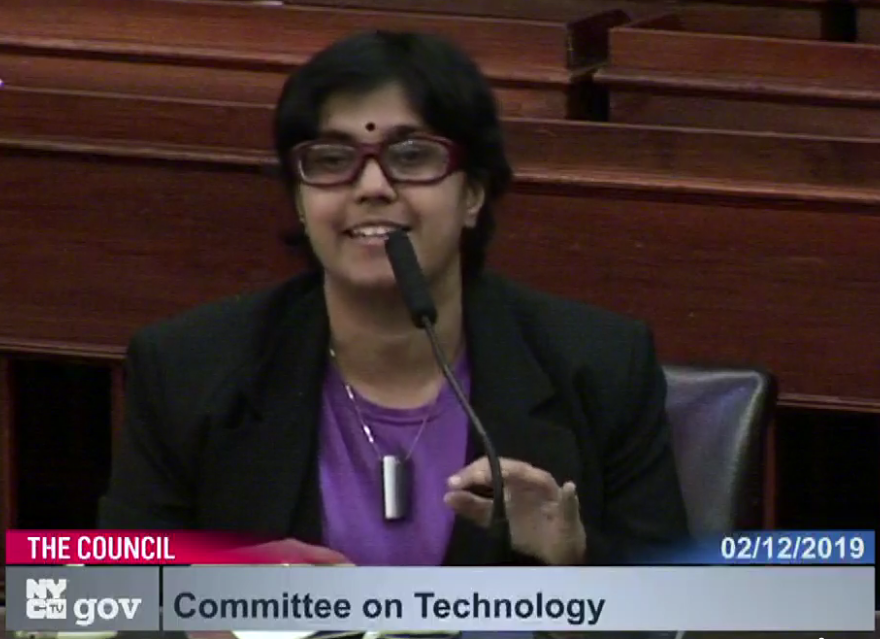 So I decided to give public comment and say a few things, such as noting that it would be nice to have more info about how the ADS task force is going -- the website lets us submit comment right now electronically, but will there be any public hearings before it delivers its findings in December?
So I decided to give public comment and say a few things, such as noting that it would be nice to have more info about how the ADS task force is going -- the website lets us submit comment right now electronically, but will there be any public hearings before it delivers its findings in December?
And I noted that I'd submitted a request through the open data portal in late 2017, and then it got closed with no reason, and I'd like to use the PAD dataset to find AED deserts in NYC and help prevent deaths from cardiac events.
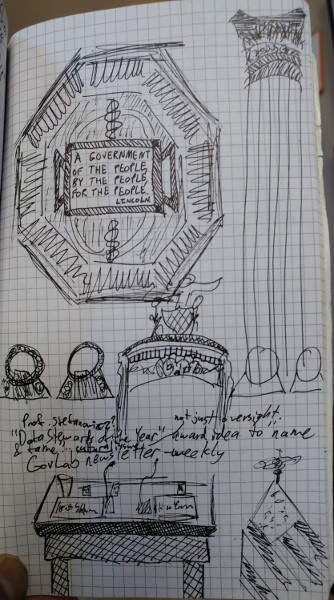 I have never escalated a bug report while sitting in front of a microphone before, but it does seem to work, and now I have a number of people's business cards, and we've spoken a bit via email and phone, and my request is progressing along again.
I have never escalated a bug report while sitting in front of a microphone before, but it does seem to work, and now I have a number of people's business cards, and we've spoken a bit via email and phone, and my request is progressing along again.
(The hearing was about three hours long; I did a lot of sketching while listening, and share those illustrations here. Cross-hatching is an especially good way to occupy myself while listening to people say things I already know.)
My email to them read, in part:
I would like to map AED deserts in New York City so I can help local merchants decide to buy AEDs and register with the PAD program. (I can go into more detail on that if you'd like.) The most recent public map showing AED units in the PAD program in New York City, as far as I know, is in DOHMH's 2010 Report to City Council on LL20 of 2005, page 7, section 3.3. In case you cannot find it, I host a copy on my site: https://www.harihareswara.net/foi/nyc_dohmh_pad_2010.pdf
Jason and I discussed whether this particular line was a "flex" and/or a "power move," a discussion which necessitated some definitional work. I think a "flex" in current parlance is a brag, a boast. OK, so yes, then, this is a flex. What is a "power move"? I think it's an assertive choice that draws attention from others, claims dominance or demands respect in some unexpected way, upsets an unspoken rule and runs the risk of insulting others in order to efficiently pursue one's own desires. And -- if I gather correctly -- it's not solely a dominance display, but a means to some other purpose as well. But I genuinely don't know whether it is potentially insulting to say to a New York City government staffer, "in case you, a city staffer, have a hard time finding an obscure agency report from 9 years ago, here's a copy from me, a private citizen". So, maybe?
Let's see how this goes! It would be lovely if we could get more PAD coverage across NYC. And I hope the ADS task force has some interim status reports soon!
# 19 Feb 2019, 07:36AM: As The Saying Goes, I'm Part Of The Precipitate:
Tonight, I'm gonna attend my local Community Board meeting, which will include an MTA presentation on the Astoria Boulevard ADA & Station Renewal project. (I hope that, after the meeting, I can hang out with other locals and toast to the end of the Amazon HQ2 giveaway.) I wondered aloud to Leonard: how will people at the meeting use the Astoria Boulevard station closure as a demand for more parking spots? (The members of my local community board mostly own homes and cars, and are far more interested in the alleged lack of parking in Western Queens than I am.)
The easy answer is: the MTA is closing a station for renovations, so more people will have to drive, so they'll say we'll need more parking spots. But: who should be responsible for providing that parking, and how? Some satirical answers we came up with:
- The MTA, by magically creating more parking on Astoria Boulevard
- Auto manufacturers -- after all, didn't they cause the problem in the first place?
- The MTA, by letting car owners hitch their cars to the end of subway trains
- Wesley Crusher, who does not need parking himself and should use his Traveller powers to transport people and cars around
- The city, which should allow buildings to zone far higher into their airspace and build parking garages into the troposphere
- The city, which should adopt a form of "congestion pricing" where if you are congested you need to pay extra to enter Manhattan -- this would also have a side benefit of reducing infectious disease. If you already live in Manhattan? You can't leave your home -- the "achoo curfew".
I do not recommend anyone do any of these things. I do recommend you joke about parking-hungry community boards.
Also if you can figure out how to make a good joke combining the Lisp function cdr and the fact that we should lengthen the G train, do make it somewhere and let me know.
# 22 Feb 2019, 09:33AM: The Fascinating Life of Dalip Singh Saund:
My latest MetaFilter blog post is "At the beginning I never thought of becoming a candidate myself." Immigrant, math Ph.D., farmer, and judge Dalip Singh Saund wasn't just the first Asian American elected to the US Congress. (In 1956, 10 years after Indians could become citizens. Running against a Republican woman aviator.)
I've known part of Saund's story for years but only a few months ago learned how his farming informed his campaign for naturalization, and dove into the books he'd written.
# 22 Feb 2019, 05:50PM: Tropes, and Missing Stories, in Art about Programming:
 "The Art of Python", the one-night arts festival about your experience of programming, is still open for proposals, till February 28th.
"The Art of Python", the one-night arts festival about your experience of programming, is still open for proposals, till February 28th.
What experiences do we want to explore? We want variety -- because there are so many experiences we don't usually see! I hope we get a range of tones -- humor, awe, melancholy, anger, joy, and so on. And I'm curious about ones we often don't discuss factually in public, because they're embarrassing or because we have non-disclosure agreements.
But also: there are so many missing stories -- even when movies, shows, books, plays, songs, etc. include programmers/programming, I so rarely find that they speak to the joys and sorrows of our experiences.
I listed, as inspirations, some of the ones that get it right, and asked for prior art. But -- admitting that I'm nearly entirely limited to English-language media -- I'm taking a moment here to reflect more deeply on what we usually get, and don't, in mass-media art about programming.
Movies and TV shows: There are a ton of movies that get the Internet hilariously wrong, and movies/shows "about programmers" are often much more about spies or tycoons. We tell a lot of dramatic stories about penetrative hacking and hockey-stick startups, and then a few workplace comedies like Dweebs, The IT Crowd, and Silicon Valley. I never saw Code Monkeys, which may have resonated more.
Halt and Catch Fire, which I enjoyed, is the only TV show I know of that is realistic about programming and its social and economic context. An important relationship starts, and is repaired, when people help each other recover from data loss. People who think that just making good hardware/code is enough for a good career find that, unless you pay attention to intrapersonal, interpersonal, organizational, economic, and social issues, you might still be able to make a living, but your work is far more likely to go into the trashbin where no one will ever use it. And: so many office/work shows are basically about people who do the same jobs for a super long time. Halt and Catch Fire reflects the reality of how you run into the same people over and over in different companies and jobs and configurations, teammate, boss, investor, competitor, family, conference co-panellist, and you bring your past to it but you can also grow, especially thanks to the healing power of making stuff together.
 Written fiction: I know of no novel-about-programming as magnificent as Ellen Ullman's amazing 2003 debugging detective novel The Bug. One of its point-of-view characters is already a programmer when the story starts, and The Bug helps us understand Ethan's bug-hunting fugues, obsession, anxiety, and volatile bounces between certainty and insecurity:
Written fiction: I know of no novel-about-programming as magnificent as Ellen Ullman's amazing 2003 debugging detective novel The Bug. One of its point-of-view characters is already a programmer when the story starts, and The Bug helps us understand Ethan's bug-hunting fugues, obsession, anxiety, and volatile bounces between certainty and insecurity:
Step, step, step.
Some part of him knew that he should get away from the debugger. He should get away from the machine, stop and think on a yellow pad, a whiteboard. He wasn't making headway like this. He kept beating against the same certainties--here, else here, else here. Writing and sketching might break his thinking patterns, force him into other channels. But there was something seductive about the debugger: the way it answered him, tirelessly, consistently. Such a tight loop: Step, he said. Line of code, it answered. Step, line of code; step, line of code. It was like the compulsion of playing solitaire: simple, repetitive, working toward a goal that was sure to be attained in just one more hand, just one more, and then one more again.
And so the paradox: The more the debugger remained the tireless binary companion it was designed to be--answering, answering, answering without hesitation or effort late into the night--the more exhausted and hesitant the human, Ethan Levin, found himself to be. He was sinking to the debugger's level. Thinking like it. Asking only the questions it could answer. All the while he suffered what the debugger did not have to endure: the pains of the body, the tingling wrists and fingers, the stiffness in the neck, the aching back, the numb legs. And worse, the messy wet chemistry of the emotions, the waves of anxiety that washed across him, and then, without warning, the sudden electric spikes of panic.
The other is Berta, an academic-turned-tester-turned-programmer who looks back on the mystery -- and on her journey towards greater engineering skill -- with the wisdom of decades in the industry.
There might have been a hundred better ways to talk to a computer, but Ethan Levin had copied the Mac, which had copied the Xerox Star, which was later copied by Microsoft Windows. Who knew our mistakes would prove so durable? ....
And that was it: a tester found a bug, a programmer ignored a tester, a bug report went to the top of a pile on a programmer's messy desk -- nothing could have been more normal than what had just happened.
The Bug is Ullman's attempt to write "a historical, technical, Gothic mystery" about the debugging process, and I think it's terrific, and not nearly enough people in our industry have read it, and I urge you to do your bit to change that.
Music: MC Frontalot and Dilbert and Jonathan Coulton used to mean a lot to me. I am literally in the documentary about Frontalot. On reflection, a lot of Dilbert is generally about corporate office work, and a bit of it (such as "I'm gonna write me a new minivan!") is particularly tech-specific. Frontalot and Coulton sing a lot about being nerds, but somewhat less about being nerds who make technology. (Some of Coulton's work that's applicable: "Code Monkey" of course, and "A Laptop Like You", "Robots.txt", and "The Future Soon" -- often ruefully discussing alienation and the way we sublimate our anxieties into our making.)
And Barcelona still holds up in depicting the way that computers can feel like friends, how we make software that feels like a companion, how we make friends across networks and then use those same networks to get back at them ("I Have The Password To Your Shell Account"), how dreary the troubleshooting treadmill feels ("Bugs Bugs Bugs"). Paul Morris talked with me about how some of Radiohead's work gets at the narrowing-field-of-vision experience of being deep in a debugging session, with the long droney periods punctuated by surprises.
Comics: And there's a whole huge conversation I probably need to find about programmer narratives as told in webcomics over the past 20 years. Randall Munroe's tagline for xkcd is "A webcomic of romance, sarcasm, math, and language." and that attention to emotion ("romance") is part of the secret of its success. Ryan North's progression from Dinosaur Comics to Marvel's The Unbeatable Squirrel Girl -- which is partially about studying CS and using programming to solve problems -- succeeds at illuminating programmer experiences in ways that literature researchers have probably studied!
Stand-up comedy: I think the only major stand-up comic who ever talks about anything close to programming is Brian Malow, who jokes much more about physical and biological sciences.
 What I want: We put several ideas in this part of the play creation guide. But also, I'd love art about, for instance:
What I want: We put several ideas in this part of the play creation guide. But also, I'd love art about, for instance:
I asked Siderea, a programmer-turned-psychotherapist whose essays I enjoy, what stories art about programming often misses, and what experiences she'd like to see reflected in art:
I would like to see art about programmers dealing with the things that can suck about being a programmer:
- Programmers dealing with unreasonable, deceitful, and manipulative management, in the ways which are specific to "overtime exempt" programmers (i.e. if you are not willing to work 120-hour weeks, you aren't really a team player)
- Programmers who are minorities dealing with broism
- Programmers realizing that what they're working on is immoral or illegal, and deciding what to do about it; programmers not realizing the moral/legal implications of what they're working on until too late
- Programmers dealing with difficulties without help because non-programmers don't even understand what the programmer is trying to say
- Programmers dealing with the stresses of writing life-impacting code (e.g. embedded systems in vehicles, medication administration systems, etc.), especially in the situation of being without managerial support for adequate QA.
- I would add something about work assignments and junior or unpopular people getting tasked to do awful or impossible tasks. Coding equivalents of Augean Stables. "Oh, we don't really have a role for you any more, so, uh, why don't you refactor this core business system for the web written in C with FORTRAN plug-ins by the most disgruntled employee we ever had."
- Ooh, here's a thing: I'd like to see art about programmers not working in software development companies. In particular, about the (sometimes disturbing) things programmers learn about other industries when they take jobs, e.g. at insurance companies, in health care systems, with the government, in the space program, etc.
 So please take a look at "The Art of Python", the one-night arts festival about your experience of programming, and consider proposing your art before February 28th. (And you can submit performance-style art to !!Con by March 3rd.)
So please take a look at "The Art of Python", the one-night arts festival about your experience of programming, and consider proposing your art before February 28th. (And you can submit performance-style art to !!Con by March 3rd.)
And if you blog somewhere about what tropes you see in art about making technology, let me know and maybe I'll add those links to this post!
# 24 Feb 2019, 12:10PM: Interesting University Press Ebooks via NYPL:
Hey New York Public Library patrons!
Today I looked at NYPL's "E-Book Central" and discovered University Press Scholarship Online. Click "Connect to database" and enter your NYPL barcode number and PIN, and you can read a bunch of books from university presses for free in your browser (or, if you accept certain additional terms, download PDFs chapter-by-chapter)!
Most of the university press books I looked for weren't in there, but I definitely saw some interesting titles, such as:
- MIT Press: Obfuscation: A User's Guide for Privacy and Protest by Finn Brunton and Helen Nissenbaum, about "the production of noise modeled on an existing signal in order to make a collection of data more ambiguous, confusing, harder to exploit, more difficult to act on, and therefore less valuable" -- and the chapter "Closer to the Metal" by Finn Brunton and Gabriella Coleman, in Media Technologies: Essays on Communication, Materiality, and Society (I met Finn a zillion years ago and always find his writing interesting)
- again MIT Press: The Computer Boys Take Over: Computers, Programmers, and the Politics of Technical Expertise by Nathan L. Ensmenger
- University Press of Mississippi: Time in Television Narrative: Exploring Temporality in Twenty-First-Century Programming, edited by Melissa Ames, about how a bunch of shows "rely upon temporal and narrative experimentation" (The Wire, Damages, Lost, Arrested Development, it goes on and on)
- Oxford University Press: Bipolar Identity: Region, Nation and the Kannada Language Film by M.K. Raghavendra
- Princeton University Press: The Golden Ticket: P, NP, and the Search for the Impossible by Lance Fortnow
- MIT Press: Venture Labor: Work and the Burden of Risk in Innovative Industries by Gina Neff
- Edinburgh University Press: Masculinity and Popular Television by Rebecca Feasey
- From University of Chicago Press, two books I noticed because Harry Brighouse (author at Crooked Timber) coedited or coauthored them: The Aims of Higher Education: Problems of Morality and Justice and Educational Goods: Values, Evidence, and Decision-Making
- Oxford University Press: Echoes of Mutiny: Race, Surveillance, and Indian Anticolonialism in North America by Seema Sohi, which I first heard about when reading about the history of anti-Asian racism in the US and South Africa and British surveillance of South Asians in the United States who advocated Indian independence in SAADA.
(You may be eligible for an NYPL card even if you don't know it yet: "Any person who lives, works, attends school or pays property taxes in New York State is eligible to receive a New York Public Library card free of charge.")
# 25 Feb 2019, 05:52PM: API Copyrightability Law Brings (Many of) Us Together:
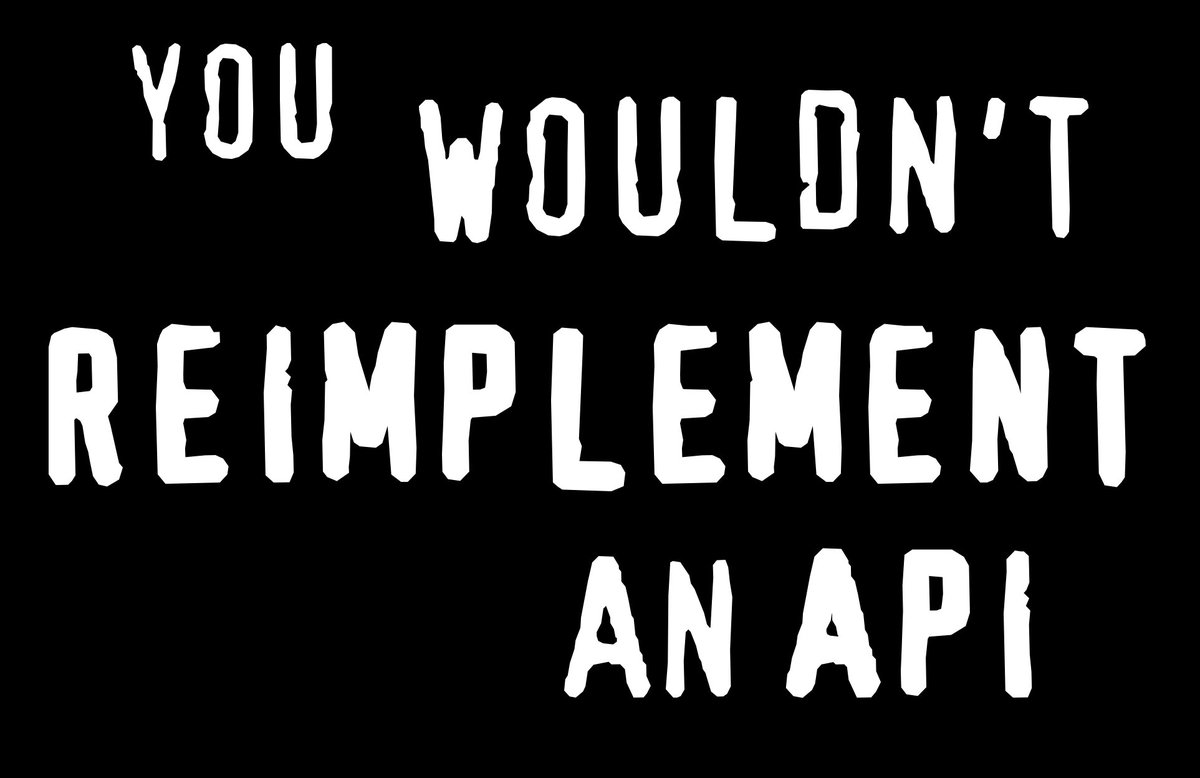 So you know that moment partway through a movie where heroes team up and stride toward the camera in slow motion while epic music plays?
So you know that moment partway through a movie where heroes team up and stride toward the camera in slow motion while epic music plays?
The Python Software Foundation's counsel, Van Lindberg, writes: @ThePSF and @tidelift just filed an amicus brief urging the Supreme Court to grant cert in Oracle v. Google. This case is central to the future of free and open source software. http://www.supremecourt.gov/DocketPDF/18/18-956/89548/20190225155816527_18-956%20Amici%20Brief%20Python.pdf
Tidelift cofounder Luis Villa notes: More on this tomorrow, but very excited to join @ThePSF in this. At @tidelift we believe in growing the pie, not fighting over the scraps, and the ability to reuse and reimplement APIs is part of how the software industry has grown (and hopefully will continue to grow!)
(Amicus/amici curiae briefs always remind me of a cartoon Seth Schoen drew.)
From the brief:
The Federal Circuit's decisions are so destabilizing because they upset the settled expectations of thousands of software developers -- and particularly open source software licensees -- across all aspects of the economy.
Yup -- one reason the docket has so many other amici briefs. As far as I can tell, all of them are in favor of the Court granting certiorari.
# 27 Feb 2019, 09:01AM: GSoC/Outreachy Mentoring Orgs: Consider Giving Applicants English Tutoring:
Google Summer of Code just announced the 207 mentoring organizations (open source projects seeking participants) for this year's round, and Outreachy's 9 mentoring orgs also announced open internship projects.
This blog post is directed at org admins and mentors for those projects.
Many of your applicants are not fluent English writers. You have probably already experienced this, but stats back me up: Last year, GSoC had 5,199 applicants from 101 countries, many of which are not countries where English is a major medium of instruction. And nearly all the schools in the top ten were engineering schools in India, and Indian engineering schools do not teach students how to write in English at what the open source world considers a professional level. That lack of communication skills hurts your applicants as engineers, and as potential open source contributors in the long run.
I was an org admin for several years and saw, over and over, how many of our applicants had a hard time getting help and getting their ideas across because of poor writing skills. Mentors reviewed code and helped them become better coders, but weren't giving the same kind of systematic feedback about emails, bug reports, and so on, so applicants' writing skills stagnated.
In 2017, to address this, I ran English tutoring sessions for Zulip contributors. You can do this too.
Here's the call for volunteer tutors I used. Note that I explained my request in terms of global diversity and inclusion, reassured them that I'd set them up in the chatroom and be available to backchannel with them, and said "It's fine if you've never done this before and it's fine if you're not a programmer and don't know programming jargon." I circulated this request in scifi fandom, in particular in the fanfic community, which has tens of thousands of people who enjoy volunteering to proofread each other's written work and chatting online. A big source of volunteers was the Radio Free Monday weekly fandom newsletter (6 March 2017). I got 30 volunteers and was able to schedule 15 of them to tutor, and several of those volunteers were willing to do multiple 90-minute sessions.
Here's the announcement email I sent to our GSoC applicant mailing list.
We ran the tutoring sessions in the "learning" channel of our Zulip chat so it was easy to paste in links, explain proper formatting, and put side conversations in another thread. Here's the Dropbox Paper shared signup sheet where I kept the schedule and instructions for learners and tutors (basically: learners show up with a short written sample and with some thoughts about how they want to improve, and tutors take 30 minutes to critique each sample). The signup sheet format was, for example:
Date & time: Sunday, March 19th, 1:00-2:30 PM ET (10:30 PM-12 AM in India)
Host: Teresa
Cohost: Sumana
Channel: https://chat.zulip.org/#narrow/stream/learning/topic/English.20tutoring
Learners:
- Ayush
- Hari
- Italo
If only one person signed up for a session, that person got help for 45-60 minutes. Or, sometimes, we got drop-ins as other contributors got curious and realized they could ask for help on their blog posts or GSoC applications as well. After I got each tutor settled in I didn't have to pay attention for the whole 90 minutes, so I could do other Zulip work and check in occasionally -- and eventually other Zulip contributors helped out by "cohosting" so sessions could happen without me.
We ran about 20 sessions, and about 40 contributors got tutoring. They wrote better internship applications, blog posts, bug reports, code comments, pull requests, and mailing list posts because of what they learned in these sessions -- and they were so grateful for even 30 minutes of in-depth advice, because some of them had never gotten friendly, personal critique of their written English from a fluent speaker before.
So please copy me! And if several people tell me their projects are doing this, I'll help publicize your efforts together. There are a lot of fluent English writers with free time and an internet connection who would love to help the open source community in this way. Like Wikipedia, we can turn "Someone is WRONG on the Internet" into a good thing. :-)
[Main] You can hire me through Changeset Consulting.

This work by Sumana Harihareswara is licensed under a Creative Commons Attribution-ShareAlike 3.0 Unported License.
Permissions beyond the scope of this license may be available by emailing the author at sh@changeset.nyc.
 You actually can use city transit to get to parks within NYC for a short or daylong hike.
You actually can use city transit to get to parks within NYC for a short or daylong hike.


 On Tuesday night, I attended
On Tuesday night, I attended  So I decided to give public comment and say a few things, such as noting that it would be nice to have more info about how
So I decided to give public comment and say a few things, such as noting that it would be nice to have more info about how  I have never escalated a bug report while sitting in front of a microphone before, but it does seem to work, and now I have a number of people's business cards, and we've spoken a bit via email and phone, and my request is progressing along again.
I have never escalated a bug report while sitting in front of a microphone before, but it does seem to work, and now I have a number of people's business cards, and we've spoken a bit via email and phone, and my request is progressing along again.

 Written fiction: I know of no novel-about-programming as magnificent as Ellen Ullman's amazing 2003 debugging detective novel
Written fiction: I know of no novel-about-programming as magnificent as Ellen Ullman's amazing 2003 debugging detective novel  What I want: We put several ideas
What I want: We put several ideas  So please take a look at
So please take a look at 
